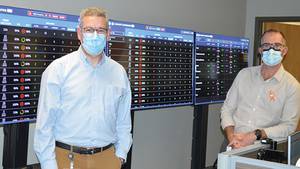 |
| Mary and Eddie Harper enjoy a stroll through the Veterans Memorial Garden at the QEII. (Darren Hubley) |
After her husband Eddie experienced multiple falls, Mary Harper knew she had to get help. She called her doctor and asked for a referral to the Falls Clinic at the Geriatric Day Hospital at the QEII Health Sciences Centre – a clinic her friends and neighbours had praised.
But on the morning of Eddie’s first appointment at the clinic in May 2013, Mary found him confused and struggling not to fall out of bed in their downtown Halifax condominium. She called the clinic to cancel the appointment, telling them she needed to take him to the emergency department. “You come here,” the nurse at the clinic told her. “You’ll get what you need.”
She was right. When Mary and Eddie, who was 89 years old at the time, arrived at the Falls Clinic, located on the first floor of the QEII’s Camp Hill Veterans Memorial building, they were met by a nurse with a wheelchair – and were immediately whisked away. Eddie underwent a series of tests that day, including a CAT scan that revealed he had suffered from a transient ischemic attack (TIA), or mini-stroke.
“The care was absolutely fantastic,” says Mary. “They did everything they could for us.”
Janet Wright, charge nurse at the Falls Clinic, says the outpatient clinic provides interdisciplinary assessment and a rehabilitative program to help elderly people function better so they can stay at home for as long as possible.
“We help alleviate emergencies,” says Janet.
Combining geriatric medicine, nursing, occupational therapy, physiotherapy and social work at one location, Janet likes to tell patients that the clinic “is sort of a one-stop shop.”
“We’re a multi-disciplinary team,” says Janet. “Our goal is to keep seniors safe.”
The clinic is open to people over age 65 who still live at home, but most patients who come to the clinic are between 80 and 90 years old. The clinic is in Halifax and most patients come from the metro area, but some travel from as far away as Truro. Referrals come from family doctors in the community and from inpatient units within the hospital. Up to 20 people attend the clinic each day, and there is currently a two-and-a-half-month waiting list for new patients.
After Eddie’s initial emergency visit, he took part in the Falls Clinic’s regular six-to-eight week program. During that period, he attended the clinic twice a week for two-hour periods. After that Eddie, like many others, chose to attend weekly fitness classes to continue the strengthening exercises he learned during the program.
“We’re the only one [that I know of] in the province using this strategy,” says Janet.
At the clinic, medical assessments are made and followed up with appropriate care; a social worker helps with arranging home supports, legal planning, and social programs; an exercise program is initiated; and a home visit is made to determine what changes can be made to make it safer.
For the Harpers this meant installing an extra handle in the shower.
“They were just so helpful,” says Mary.
On each visit to the Falls Clinic, Mary was relieved to have a nurse assess Eddie, take his heart rate and blood pressure. Each day at the clinic, Eddie, a father of four and former insurance business owner, would do exercises with a small class to help strengthen his body.
“He felt he was doing something for his own well-being,” says Mary.
Located in a calm space in the hospital, Janet says it is a welcoming place.
“It’s like getting a warm hug coming here.”
Mary couldn’t agree more.
“The staff’s knowledge is professional, but their care giving is very warm,” says Mary. “You feel you are part of a family.”








